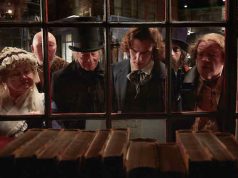It was in an essay about Cameron Crowe’s “Elizabethtown” that film critic Nathan Rabin coined the term “Manic Pixie Dream Girl” to describe a type of “bubbly, shallow” female character who exists “to teach broodingly soulful young men to embrace life and its infinite mysteries and adventures.” The term was Rabin’s, but the character has been around forever — think Audrey Hepburn in “Breakfast at Tiffany’s,” or Barbra Streisand in “What’s Up, Doc,” or Zooey Deschanel in anything. The MPDG is now a bona fide stock character, alongside Wacky Neighbor, Blustery Police Chief, and Eccentric Millionaire.
Which makes it ripe for a deconstructing. Here to provide that is “Ruby Sparks,” a smarter-than-average romantic comedy directed by “Little Miss Sunshine” husband-and-wife duo Jonathan Dayton and Valerie Faris and written by Zoe Kazan, who also plays the title character, a manic pixie who is literally someone’s dream girl.
The soulful young man who imagines Ruby Sparks (boy, that name is perfect, isn’t it?) is Calvin (Paul Dano, Kazan’s real-life boyfriend), a 29-year-old bookworm who wrote a bestselling novel when he was 19 but has failed to follow it up with anything. On a personal level, he still feels wounded and victimized by the disintegration of his last relationship.
One night he dreams of a winsome gal named Ruby Sparks who becomes his girlfriend, and poof! No more writer’s block. He transcribes the dream to paper via his manual typewriter — a hipster affectation that actually does work better for the film’s story than a laptop would — and is thrilled to be back on track. His brother, Harry (Chris Messina, who couldn’t be less Paul Dano’s brother), is less enthusiastic after reading the pages. “Quirky, messy women whose problems only make them endearing aren’t real,” he says. “You haven’t written a ‘person,’ you’ve written a ‘girl.'”
That observation is both accurate and familiar: “Ruby Sparks,” which at first seemed to be setting up a generic MPDG scenario, is now instead commenting on those scenarios. Girls like Ruby only exist in movies and in writers’ imaginations. So it is strange when Ruby suddenly appears in Calvin’s home, in the flesh, her biography matching what he wrote. In fact, he can go back upstairs and type something new — that she speaks fluent French, say — and return to find that it is so. Like all writers, Calvin wields absolute power over his characters. It’s just that this particular character has magically come to life, that’s all.
Having established this whimsical dream-come-true situation, the film now sneakily subverts it. Without regular maintenance (i.e., new drafts and revisions), Ruby’s love for Calvin starts to cool, the way many romances do. Yet exercising too much writerly control over her feels unfair to him. Calvin experiences the literal embodiment of a figurative problem he has often had, one that many of us can relate to: we can’t change people to be the way we want them to be — and even if we could, the results wouldn’t satisfy us.
Kazan and Dano, who have been dating for five years, have an authentic onscreen chemistry that resists being too cutesy. Neither is what you’d call conventionally beautiful; their everyday attractiveness makes them relatable. Kazan’s screenplay (her first) has more on its mind than just giving her and her boyfriend a chance to make a movie together. It delves into the way we idealize our romantic partners, the way we try to control one another, the way we often fail to learn from our mistakes. Along the way, the film also functions well as a gently funny and intelligent relationship comedy, something a little more sophisticated than the Katherine Heigl-y norm.
B+ (1 hr., 44 min.; )




